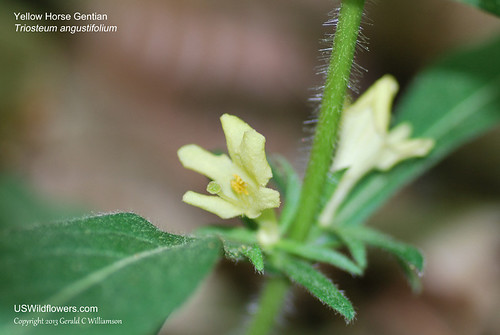Yellow Horse Gentian, a native species, has been added to the USWildflowers database (05/18/2013.) Scientific name is Triosteum angustifolium. Photo below was taken near the Blue Hole on Pigeon Mountain, Walker County, GA on April 16, 2010. Go to the Yellow Horse Gentian detail page for more photos and information.


I applaud your wonderful efforts in creating these sites. They do a true service to educate us and enhance appreciation of nature and our life-giving relationships within it.
I was shocked, however, that Terminex, a “pest control” industry is an advertiser on the wildflower site. Whereas some killing of some insects in specific instances may be called for, I believe that most use of pesticides is indiscriminate, reactionary, by users ignorant of the role of insects in earth’s ecosystem. Do you have any control over what company benefits from advertising on the site?
To promote chemical pesticide eradication of insects on the wildflower site while most of the public still does not recognize the crucial role of insects to the health and life of plants and animals is deeply disturbing.
C. Rawleigh
Hi. I appreciate your visit and comment.
The advertisements from Google are context-sensitive in that where possible they (reportedly) not only try to fit into the theme of the website upon which they are displayed, but they also use your browsing history (presumably via cookies) to “know” the interests of the visitor. So while I have never seen a Terminix advertisement on USWildflowers.com, that is likely because I haven’t visited sites or made searches pertaining to pest control or insecticides. On the other hand, with your clear passion for saving our critical insects and pollinators (“Polly Nader” – I like that) you have likely recently visited websites relevant to that subject.
I do have some limited control over the advertisements that are displayed. I have rejected certain categories of advertisement to help ensure a family-friendly atmosphere here. I’m not sure if the control I have would provide suitably narrow filtering to eliminate this ad if I chose to do so, but that’s worthy of some further research on my part.
I do agree with you that insecticides (and herbicides) are overused, and I’d like to see their use reduced. However, I don’t draw the direct connection between the loss of insect pollinators and the use of pesticides to help protect our houses from damage and protect us from some diseases. I think the *responsible* use of pesticides in households is acceptable, and that advertisement, if nothing else, has elicited this conversation which will hopefully help raise awareness of that subject. It certainly has done so for me.
Thanks again.
gcw